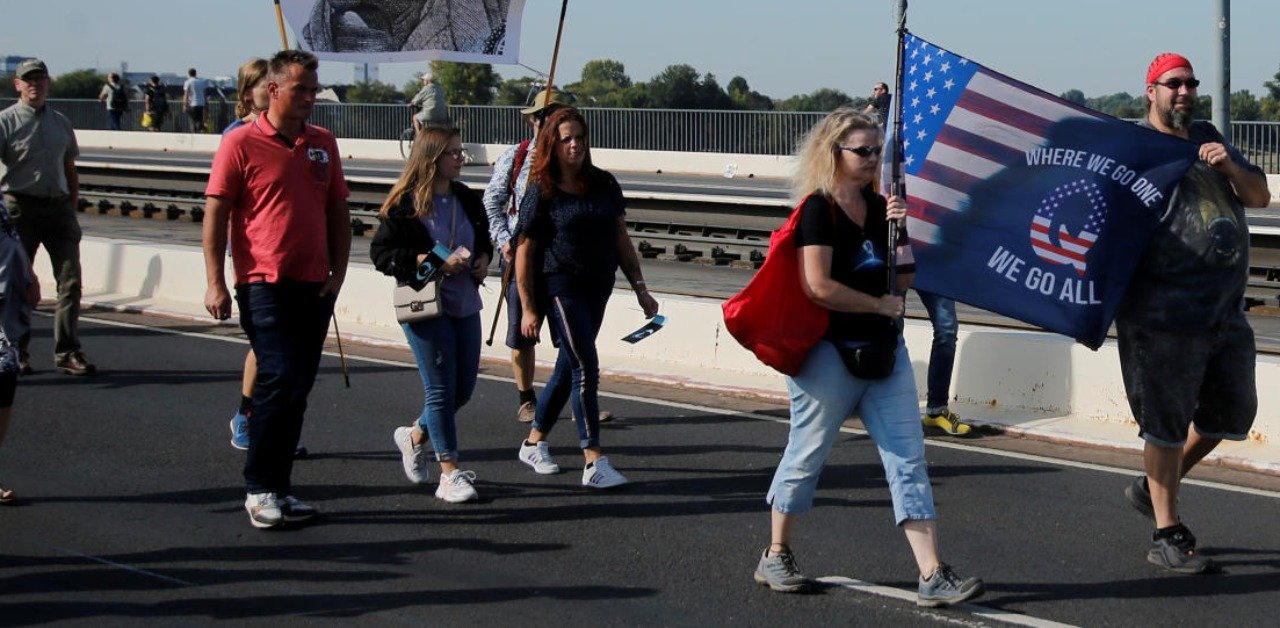As Europe’s Covid-19 cases rise, so do voices crying hoax

Alongside a strip of candy-colored houses on London’s Portobello Road, a freshly scrawled message blared out from the older graffiti on a garage door: “Take off your mask!”
The sentiment echoed that of thousands of unmasked protesters who packed Trafalgar Square in the center of the city on Saturday, and a week earlier, rallying against Britain’s coronavirus restrictions. Many called the pandemic a hoax — even as the global death toll neared 1 million.
“No more lies, no more masks, no more lockdown,” one sign read.
CORONAVIRUS SPECIAL COVERAGE ONLY ON DH
In Berlin, Brussels, Dublin and Paris, similar gatherings have gone ahead in recent weeks as coronavirus cases are again rising across much of Europe. But with health experts warning that a second wave has already arrived in some places and with many governments moving to reintroduce restrictions, the ranks of those dismissing the dangers of the virus and others calling it a government-led hoax have swelled.
Daniel Jolley, a senior lecturer in psychology at Northumbria University and an expert in conspiracy theories, said the emergence of a growing, vocal contingent of people who believed governments were not being truthful about the pandemic was unsurprising.
For latest updates and live news on coronavirus, click here
“People are drawn to conspiracy theories in times of crisis,” Jolley said. “When there is something happening — a virus outbreak, rapid political change, the death of a celebrity, a terrorist attack — it breeds conspiracy theories.”
The prolonged nature of the pandemic and the prospect of a new round of government restrictions, he believes, have only deepened that distrust and potentially spurred on the naysayers.
“People are trying to understand the world in which we live,” he said, whether or not that explanation is rooted in reality. “But when you have this belief, you hold on to it, and you ascribe to evidence that supports your viewpoint.”
This was the mentality on display at recent protests against the coronavirus restrictions that have popped up in cities across Europe, which have at times turned violent. On Saturday, at least four police officers were injured in clashes in Trafalgar Square.
At another protest in the square a week earlier, Kate Shemirani — a nurse placed on an interim suspension by Britain’s Nursing Council this summer after complaints about her claims that the coronavirus is fake or linked to 5G mobile networks, and about her outspoken anti-vaccine stance — told the crowd: “They want you all wearing a mask, there’s no science behind that mask. That mask is going to make you sick.”
Science has long shown that wearing a mask can prevent a person from spreading airborne illness, and new research suggests that it also protects the person wearing it. But Shemirani, and many others, are unswayed.
The movement has attracted some prominent supporters. This month, singer Van Morrison released three new lockdown protest songs, recorded in Belfast and England in recent weeks, criticizing the government’s measures but also claiming scientists are “making up crooked facts” about the virus.
Northern Ireland’s health minister, Robin Swann, called the songs “dangerous” in an interview with BBC Radio Ulster.
“I don’t know where he gets his facts,” Swann said of the new songs. “I know where the emotions are on this, but I will say that sort of messaging is dangerous.”
In France, where infections have skyrocketed with a daily average of 12,000 new cases reported over the past week, critics have questioned the effectiveness of masks and new measures to control the spread, while others have urged people to ignore the government’s guidance entirely.
A study released in early September by Fondation Jean Jaurès, a Paris-based research institute, found that many opponents of mask-wearing believed it was useless or dangerous to their health and a tool of oppression by the government. As many as 90% of the anti-maskers surveyed — and 43% of the wider French population — believed that the country’s Health Ministry was colluding with pharmaceutical companies to hide information about the harmfulness of vaccines.
“There is a significant part of the population that does not believe or no longer believes in the noxiousness of the virus,” said Antoine Bristielle, the sociologist who conducted the study.
Bristielle said that the pandemic had provided “an extremely fertile ground” for conspiracy theories because of its many uncertainties.
Around 200 people demonstrated in Brussels against coronavirus restrictions in early September, taking particular aim at mask requirements. The protest was the second organized in the Belgian capital by a fringe group called “Viruswaanzin,” or “Virus Madness,” and was quickly dispersed by police.
The group, which staged similar protests in the Netherlands, does not deny the existence of Covid-19 but believes that measures taken by the governments are “disproportionate to the scale and threat of the disease,” said Michael Verstraeten, one of the organizers, in an interview with Radio 2, a public radio station.
Verstraeten, a lawyer, is representing a group of Belgian citizens who sued the government for infringing on their freedoms by imposing coronavirus restrictions. The presiding judge dismissed the case in July, saying that “the intellectual poverty of their argument is mind-boggling.”
An estimated 50,000 people attended a protest in Berlin last month, among them some far-right extremists and QAnon conspiracy theorists. Yet the group that organized the event, Querdenken-711, tends to be more moderate, for the most part claiming that the severity of the virus is overblown, although some call it a hoax.
A more extreme variant is being pushed by a growing and vocal number of German QAnon supporters, who contend that powerful players behind the scenes are using the virus to control the masses.
Slovakia, which on Friday recorded its highest number of new daily cases for a third day in a row, has also struggled to deal with conspiracy theories. The country’s Ministry of Health this summer appointed a specialist to fight disinformation about the pandemic.
Vladimir Snidl, a journalist and expert on disinformation from Slovakia’s Dennik N newspaper, said that coronavirus deniers had found like-minded voices in already popular Facebook groups.
“In the different anti-vaxx, anti-government and so-called ‘patriotic groups,’ questioning Covid-19 has become the new mainstream,” he said.
Perhaps as a result, just 62.5% of Slovaks supported the recommendation to wear masks in public, compared with 94% in March, according to a poll conducted for the broadcaster Markiza.
Similar threads can be seen throughout many of the protests in Europe, with links to similar conspiracy theories in the United States, and experts agree that the protests seem to be gaining strength. But they warn that the growing support for these once fringe theories poses a growing threat.
Jolley, the conspiracy theory expert, warned that while it was easy to dismiss such theories, their adherents could have a real effect on public health.
“If people don’t vaccinate or wear their masks,” he cautioned, “that is going to impact us all, not just individuals.”
*** This article has been archived for your research. The original version from Deccan Herald can be found here ***


